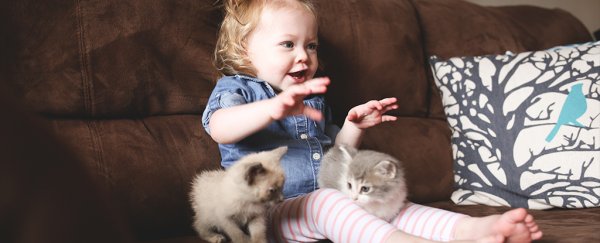Having a pet when you're a kid is awesome, but now it looks like cats have an extra benefit - they could offer protection against certain pulmonary conditions like bronchitis and pneumonia.
Before you rush off and buy your newborn an anti-asthma kitty, you should know there's a catch - if you happen to have mutated versions of a certain gene, feline fluff could also trigger eczema. So, yay or nay?
Research by a team of scientists from the Copenhagen Studies on Asthma in Childhood Research Centre (COPSAC) in Denmark has provided a possible explanation for why studies on pets and asthma are so conflicted.
So far studies have shown contradictory results - owning a pet can help prevent certain hypersensitivity disorders, make no difference at all, or make them worse.
It turns out the devil might be in the detail. And that detail is a variation of the gene 17q21.
Called TT, the genetic variant has already been found to double the risk of 'atopy' conditions such as asthma and inflammation of the bronchi, making it a prime candidate for studies looking at environmental influence on childhood development.
In the latest study, researchers analysed the medical, genetic, and environmental information from 377 Danish children whose mothers were diagnosed with a history of asthma. This included a map of their genes, and samples of allergens collected from their beds.
Just under a third of the children carried the TT variant, which should have made them more susceptible to developing asthma themselves.
On analysing the numbers, however, it turned out that having cat dander around when they were born, reduced the risk impact of the gene.
In other words, if you're unlucky enough to have the particular gene that doubles your chances of getting asthma, getting a cat early can help mitigate that risk.
The exact process behind the added protection isn't clear. Allergens could be directly interfering with the gene's expression, or maybe it's more convoluted, involving microbes in the cat's microflora.
Whatever it is that cats shed, puppies don't have it. There was no similar decrease in asthma risk for those newborns who shared their home with a dog.
While the research doesn't point directly to a preventative treatment for asthma, it does emphasise how complicated disease development can be.
"For me, this is the core message because it's a recognition in the direction of how disease occurs," says researcher Hans Bisgaard.
"It documents the interplay between genetics and the environment we live in, and in particular that this occurs very early in life, both during pregnancy and in the home."
Just to add to the problem, there could be a cost to buying junior a cat. Previous research conducted by COPSAC had found that people with mutant versions of the gene encoding a binding protein called filaggrin suffered an added risk of developing eczema if they had a cat.
Having a dog, on the other hand, offered a moderate amount of protection for those with and without the mutation.
Short of getting genetic screens done and buying a pet based on our unique genetics – which, by the way, could one day be a reality – we're left with a gamble.
On the balance, having some kind of pet or two around growing children seems to provide a bunch of benefits, so you can't go wrong either way. But it's also possible that many of those advantages have nothing to do with the animals themselves.
But we have more information now about the interaction between asthma and kitties, and the good news is that even for asthma-prone people, a cat can be a very good thing.
This research was published in the Journal of Allergy and Clinical Immunology.
